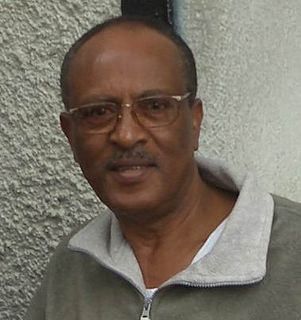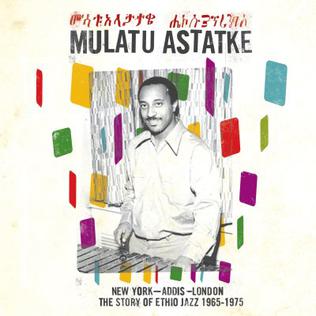Related Research Articles
Ethiopian music is a term that can mean any music of Ethiopian origin, however, often it is applied to a genre, a distinct modal system that is pentatonic, with characteristically long intervals between some notes.

Tilahun Gessesse was an Ethiopian singer regarded as one of the most popular Ethiopian artist of the 20th century. Noted by his tenor voice, he was nicknamed "The Voice" during his country's "Golden Age" in the 1960s. Tilahun was an eminent singer whose works are attributed legacy to Ethiopian music. Besides his popularity, he raised money for aid during the famines of the 1970s and 1980s and earned the affection of the nation, being awarded a doctorate degree by the University of Addis Ababa and also winning a lifetime achievement award from the Ethiopian Fine Art and Mass Media Prize Trust.
Éthiopiques is a series of compact discs featuring Ethiopian singers and musicians. Many of the CDs compile songs from various singles and albums that Amha Records, Kaifa Records and Philips-Ethiopia released during the 1960s and 1970s in Ethiopia. Prominent singers and musicians from this era appearing on Éthiopiques releases include Alemayehu Eshete, Asnaketch Worku, Mahmoud Ahmed, Mulatu Astatke and Tilahun Gessesse. However, some other releases contain new recordings.
Kaifa Records was an Ethiopian record label. It released 53 records between 1973 and 1977. Ali Abdella Kaifa, better known as Ali Tango, managed the company.

The culture of Ethiopia is diverse and generally structured along ethnolinguistic lines. The country's Afro-Asiatic-speaking majority adhere to an amalgamation of traditions that were developed independently and through interaction with neighboring and far away civilizations, including other parts of Northeast Africa, the Arabian Peninsula, India, and Italy. By contrast, the nation's Nilotic communities and other ethnolinguistic minorities tend to practice customs more closely linked with South Sudan and/or the African Great Lakes region.

Mulatu Astatke is an Ethiopian musician and arranger considered as the father of Ethio-jazz.

Mahmoud Ahmed is an Ethiopian singer. He gained great popularity in Ethiopia in the 1970s and among the Ethiopian diaspora in the 1980s, before rising to international fame with African music fans in Europe and the Americas.

Alemayehu Eshete Andarge was an Ethiopian singer. He had performed since the 1960s and primarily in Amharic. He had been nicknamed "the Ethiopian Elvis".
Russ Gershon is an American saxophonist, composer, arranger, and founder of the Either/Orchestra in Massachusetts in 1985.
The Either/Orchestra (E/O) is a jazz group formed by Russ Gershon in Cambridge, Massachusetts, USA, in 1985. E/O is configured as a "small big band", with three saxes, two trumpets and one or two trombones. E/O's is characterized by a heavier and more orchestrated sound than that of a smaller jazz combo, but remains more streamlined and improvisation-oriented than most big bands.
Buda Musique is a French record label specializing in world music. It was founded in 1987 by Gilles Fruchaux and Dominique Buscall. After Buscall died in 1990, Fruchaux became the sole owner. The label is especially known for its Éthiopiques series.
Girma Bèyènè, born in Addis Ababa, is a popular Ethiopian lyricist, composer, arranger, vocalist, and pianist, most active during the golden era of Ethiopian vinyl records (1969–78). He only recorded four songs as a vocalist, but arranged more than 60 titles, and collaborated on at least 25 other tracks. Girma left Ethiopia during the Derg military dictatorship to live in the United States, where he disappeared into the diaspora and ceased to play music. He released a new album in 2017, part of the Ethiopiques collection.

New York–Addis–London: The Story of Ethio Jazz 1965–1975 is a compilation album of work by jazz artist Mulatu Astatke. The album covers his early recordings in the UK in 1965, his work on the Worthy label in New York and his recording in Addis on Amha, Phillips and Axum in the 1970s. The album received the "Best New Reissue" honor from Pitchfork Media.
Tizita/Tezeta/tazata(Amharic: ትዝታ; English: memory, "nostalgia" or "longing") is one of the Pentatonic scales or Qañat of the Amhara ethnic group.
Walias Band were an Ethiopian jazz and funk band active from the early 1970s until the early 1990s. Formed by members of the Venus Band, Walias backed up many prominent singers with a hard polyrhythmic funk sound influenced by western artists like King Curtis, Junior Walker and Maceo Parker. In 1977 they recorded one of the few albums of Ethiopian instrumental music in collaboration with vibraphonist Mulatu Astatke, whose role as a bandleader and composer was also a major influence on Ethiopian popular music.
Selam Seyoum Woldemariam, also known as Selamino, is an Ethiopian musician and guitarist. He has turned out 250 albums in his more than forty years as a professional musician. He has been called "The Jimi Hendrix of Ethiopia" and is a national legend.
Getachew Kassa is an Ethiopian singer and percussionist. He was famous at the height of 1960s and 1970s after hiring to the country's famous clubs, the Sombrino and Axum Hall, which made him eligible to professional skills.
Francis Falceto is a contemporary French musicologist and music producer, specialising in World music and in particular music of Ethiopia which he helped propagate internationally from 1986 onwards.
References
- 1 2 Harris, Craig. Amha Eshete at AllMusic. Retrieved 19 March 2015.
- ↑ Falceto, Francis. Liner Notes. Éthiopiques Volume 4: Ethio Jazz et Musique Instrumentale 1969-1974. By Mulatu Astatke. Buda Musique 82964-2, 1998.